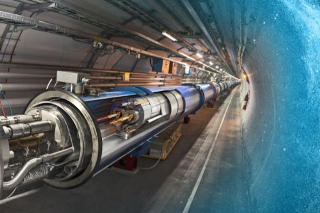Apr 13 2015
Scientists from the Particle Physics Research Group at the University of Bristol are celebrating the restarting of CERN’s Large Hadron Collider (LHC) today, after two years of upgrade work.
 A 3D dipole integration showing several parts of the LHC with an interconnection open CERN 2015
A 3D dipole integration showing several parts of the LHC with an interconnection open CERN 2015
The particle collider, located on the Swiss-French border near Geneva, has undergone a comprehensive overhaul, which means it is now capable of colliding particles at twice the energy and greater intensity than previously achieved.
In 2012, the LHC team discovered the Higgs boson, an elementary particle whose existence explains why fundamental particles have mass. The Higgs is pivotal to the Standard Model and other theories within particle physics, and its discovery has opened up a huge range of new research.
While the Higgs boson completes the Standard Model, the theory still has many gaps. For example, it includes no description of dark matter, the stuff which makes up 85 per cent of matter in the universe according to observations by astrophysicists. The upgraded LHC will provide data that should allow physicists to fill in some of these gaps.
Bristol scientists are currently working on two experiments at CERN: the CMS (Compact Muon Solenoid) experiment, which aims to discover new particles and study their properties, and the LHCb (Large Hadron Collider beauty) experiment, exploring how matter survived the Big Bang and built the Universe we inhabit today.
Dr Sudarshan Paramesvaran and colleagues upgraded the Level 1 'trigger' system for CMS. The trigger automatically sifts through the billions of collisions that occur every second in the detector, recording only those events of interest. The new system will optimise the speed and accuracy of data collection from the collider.
Dr Marco Adinolfi and colleagues work on the part of the LHCb detector which identifies whether particular particles are pions, kaons, protons, and so on. Their upgrades have made the detector much more efficient at recognising particles at the new accelerator energy.
Other members of Bristol’s Particle Physics Group have also been busy during the shutdown, analysing the huge amount of data generated during the previous run of the LHC.
Professor Dave Newbold, who heads up the group, said: “The discovery of the Higgs boson in 2012 was a huge breakthrough, but the real excitement starts now. The upgraded LHC will allow us to probe further than ever before, and to explore brand new scientific territory such as dark matter.”